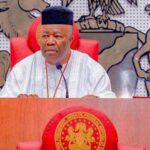The Socio-Economic Rights and Accountability Project (SERAP) recently disclosed that it had asked President Muhammadu Buhari to instruct the Director-General and Board of the National Pension Commission (PenCom) to stop the 36 state governors from borrowing and/or withdrawing N17 trillion from the pension funds for infrastructural development.
Tweeting on its twitter handle, @SERAPNigeria, the advocacy organisation said, “The governors last week reportedly proposed to borrow around N17trn from the pension funds after receiving a briefing from Kaduna State Governor, Mallam Nasir el-Rufai, Chairman of the National Economic Council Ad Hoc Committee on Leveraging Portion of Accumulated Pension Funds.”
Urging the president to stop the proposed borrowing, SERAP said it would lead to serious losses of retirement savings of millions of Nigerians.
BREAKING: We’ve asked President Buhari to urgently instruct the Director-General and Board of the National Pension Commission [NPC] to stop the 36 state governors from borrowing and/or withdrawing N17 trillion from the pension funds purportedly for ‘infrastructural development.’
— SERAP (@SERAPNigeria) December 6, 2020
Similarly, the Nigeria Union of Pensioners (NUP) has kicked against the plan to borrow from the pension fund, noting that the government has no authority over the money and should, therefore, not tamper with it.
NUP’s Head of Information, Bunmi Ogunkolade, said the governors have no authority over the money as it does not belong to them.
“How can they approve a proposal to borrow part of the workers’ pensions, which many of them (governors) are not contributing to? Do you know that many of the states are not paying the contributory pension?” he queried.
The Checks
Meanwhile, checks show that governors cannot borrow the said N17 trillion for several reasons.
To start with, the entire pension fund and assets under the Contributory Pension Scheme (CPS) is not up to N17 trillion.
Data from the National Pension Commission showed that as at August 31, 2020, the entire pension assets under the management of Pension Fund Administors (PFAs) was N11.35 trillion, being N5.65 trillion less than the N17 trillion.
In any case, even if the nation’s total pension assets is more than N17 trillion, the Pension Reform Act (PRA), 2014 would not allow the governors to withdraw or borrow the said fund.
Section 89, subsection 1, paragraph C of the PRA, 2014, provides that a PFA shall not “apply any pension fund assets under its management by way of loans and credits or as collateral for any loan taken by a holder of a retirement savings account or any person whatsoever.”
This simply means that governments at Federal, States and Local levels can only access pension fund assets through investments made by the PFAs in Treasury Bills issued by the Central Bank of Nigeria or Bonds (including Sukuk) approved by the Securities & Exchange Commission (SEC) and other relevant Institutions.
Section 2, subsection 6 of the 2019 Regulation on Investment of Pension Fund Assets issued by PenCom provides that “A PFA shall not engage in borrowing or lending of pension fund assets.”
The PRA 2014 and the 2019 Regulation on Investment of Pension Funds clearly stipulate the allowable financial instruments in which pension fund assets can be invested and these are Equities; Federal Government Securities; State/Local Government Bonds; Corporate Debt Securities; Money Market Instruments; Open/Closed-end Funds; Infrastructure Bonds & Funds; Private Equity Funds and any securities/instruments that may be approved by PenCom, from time to time.
In any case, even if the governors hide under state securities to access pension funds for infrastructure development, they will still not be able to make PFAs invest in them because most of the states do not comply with the CPS.
Section 90 (1) of the PRA, 2014 empowers PenCom to “by regulations, impose additional restrictions on investments by Pension Fund Administrators with the object of protecting the interest of the beneficiaries of the Retirement Savings Accounts.”
In view of the above provision of the law, Section 2, subsection 8 of the PenCom’s 2019 Regulation on Investment of Pension Funds states that “Pension fund assets shall only be invested in bonds, Sukuk or other debt instruments issued by eligible State/Local Governments and Corporate Entities that are fully implementing the Contributory Pension Scheme.”
“Eligible States and Local Governments” or “Eligible Listed or Corporate Entities” mean entities that are fully implementing the CPS, as confirmed by the Commission on its website.
This regulation ensures that PFAs do not invest in the securities of states yet to fully comply with the CPS.
Data sourced from PenCom show that only 25 states have enacted laws on CPS, out of which only 10 states have started remitting employer and employee pension contributions.
The low compliance with the CPS at sub-national levels may not be unconnected to the low investments by PFAs in state securities.
For instance, PenCom report shows that as at August 31, 2020, only N148.13 billion pension fund has been invested in state securities, translating to merely 1.31 percent of the total pension assets of 11.35 percent.
On the other hand, the Federal Government’s considerable compliance level with the CPS, may not be unconnected to why PFAs invested N7.52 trillion in its bonds and treasury bills, translating to 66.27 percent of the total pension funds.
It is important to note that such investments are not loans as the PFAs can divest from such investments at any time, have limitations on the percentage of pension funds to be invested in each security, and only invest in them from expert analysis based on projected returns on investment and safety of the funds.
Meanwhile, state governors, whose states have fully complied with CPS, can explore the option of the Investment Regulations issued by PenCom, which allow indirect investment of pension funds in infrastructure through Infrastructure Funds or Bonds.
The Director General of PenCom, Aisha Dahir-Umar, said the Commission recognises the need for channeling pension funds towards economic development through safe and viable investment outlets.
The PenCom boss said “there are limited Infrastructure Bonds and Funds available for pension funds to invest. It is expected that PFAs would continue to make pension funds available for infrastructure financing as long as the products offered are viable bankable and meet the requirements of the Regulation.”
She said as much as PenCom is desirous of encouraging pension fund investments in infrastructure g, the Commission would not compromise on the major objectives of pension fund investments, which are safety of the assets and maintenance of fair (real) returns on investments.
Similarly, the Minister of Finance, Budget and National Planning, Mrs. Zainab Shamshuna Ahmed, recently dispelled rumours of government borrowing from pension funds.
Fielding questions when she met with capital market stakeholders this year in Lagos during a visit to the Nigerian Stock Exchange (NSE), Mrs Ahmed said, “we won’t borrow from pension fund assets. Pension funds are very sensitive, so we have to be careful.”
Conclusion
In sum, available data, pension legislation and regulations show that state governors cannot take a loan of N17 trillion from pension assets. The country’s total pension assets are far below the sum some governors are hoping to borrow from. Besides, the Pension Act forbids such borrowing. At best, if governors need pension funds to fix infrastructure in their respective states, they need to domesticate the CPS, fully comply with the contributory scheme, work with financial experts to develop investible infrastructure bonds and other instruments, and then leave the final decision to PFAs on whether such securities are profitable and safe enough for pension funds to be invested in them.
The researcher produced this fact-check per the Dubawa 2020 Fellowship partnership with Daily Trust to facilitate the ethos of “truth” in journalism and enhance media literacy in the country.




